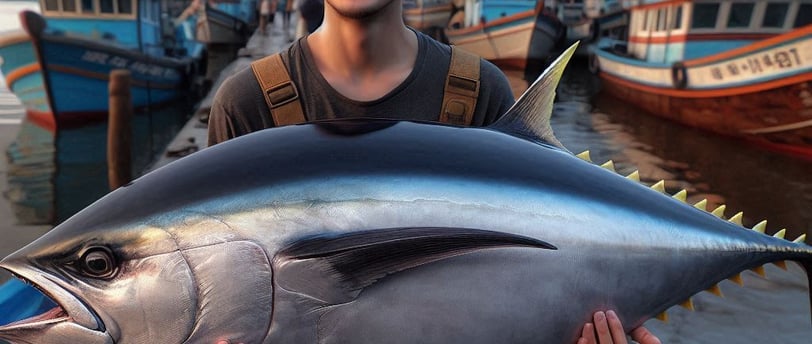The Impact of Overfishing on Supply
Overfishing has become a significant issue affecting marine ecosystems, food security, and the global economy. This short paper explores the impact of overfishing on fish supply, emphasizing the need for sustainable fishing practices.


Introduction Overfishing has become a significant issue affecting marine ecosystems, food security, and the global economy. This short paper explores the impact of overfishing on fish supply, emphasizing the need for sustainable fishing practices.
Depletion of Fish Stocks Overfishing leads to the depletion of fish stocks, as species are harvested faster than they can reproduce. This disrupts the balance of marine ecosystems, threatening biodiversity and the availability of certain fish species. Key species like cod, tuna, and salmon have seen dramatic declines in population, affecting both commercial and recreational fishing.
Economic Consequences The decline in fish stocks has severe economic implications. Coastal communities that rely on fishing for their livelihoods are particularly affected. The scarcity of fish drives up prices, impacting consumers and businesses alike. Overfishing also results in the loss of jobs and revenue in the fishing industry, exacerbating economic challenges in affected regions.
Food Security Concerns Fish is a vital source of protein for billions of people worldwide. Overfishing threatens food security by reducing the availability of this essential food source. As fish become scarcer, communities that depend on fish for nutrition face increased risks of malnutrition and food scarcity.
Environmental Impact Overfishing not only depletes fish populations but also causes significant environmental damage. Destructive fishing practices, such as trawling, destroy marine habitats, including coral reefs and seagrass beds. This loss of habitat further threatens marine species and undermines the overall health of ocean ecosystems.
Sustainable Solutions To mitigate the impact of overfishing, adopting sustainable fishing practices is crucial. Measures such as establishing marine protected areas, enforcing catch limits, and promoting responsible fishing practices can help preserve fish stocks and ensure long-term sustainability. International cooperation and robust regulation are essential to combat overfishing and protect marine resources.
Case Studies of Affected Species
Atlantic Cod: Once abundant in the North Atlantic, the Atlantic cod population has been severely depleted due to overfishing. This has led to the collapse of fisheries in regions like Newfoundland, causing economic hardship and loss of jobs.
Bluefin Tuna: Highly prized for sushi and sashimi, bluefin tuna stocks have been drastically reduced. Despite international efforts to manage quotas, illegal and unreported fishing continues to threaten their survival.
Chilean Sea Bass: Also known as Patagonian toothfish, this species has faced intense fishing pressure due to high market demand. Strict regulations and sustainability certifications have been introduced to help protect the species, but challenges remain.
Technological Advances in Sustainable Fishing Technological innovations are playing a crucial role in promoting sustainable fishing practices. These include:
Real-time Monitoring: Satellite technology and drones are being used to monitor fishing activities and enforce regulations more effectively.
Bycatch Reduction Devices: New fishing gear designed to reduce bycatch (the unintentional capture of non-target species) is being implemented, helping to preserve marine biodiversity.
Aquaculture Advancements: Sustainable fish farming practices are being developed to reduce pressure on wild fish stocks, providing an alternative source of seafood.
Community-Based Conservation Efforts Local communities are increasingly involved in conservation efforts to combat overfishing. Examples include:
Community Fishing Areas: Designating specific areas for local fishers, promoting sustainable practices and reducing competition with industrial fishing fleets.
Participatory Governance: Engaging communities in the decision-making process for managing marine resources, ensuring their voices are heard and respected.
International Agreements and Policies Global cooperation is essential to address the issue of overfishing. Key international agreements and policies include:
United Nations Convention on the Law of the Sea (UNCLOS): Provides a legal framework for the management of marine resources and establishes guidelines for the sustainable use of the oceans.
Convention on International Trade in Endangered Species (CITES): Regulates the trade of endangered species, including many fish species, to ensure their survival.
Regional Fisheries Management Organizations (RFMOs): These organizations coordinate efforts among countries to manage fish stocks in specific regions, implementing measures such as catch limits and closed seasons.
Conclusion Overfishing poses a serious threat to fish supply, with far-reaching consequences for ecosystems, economies, and food security. By embracing sustainable fishing practices and international cooperation, we can safeguard the future of our oceans and the communities that depend on them.
By understanding the multifaceted impact of overfishing and embracing innovative solutions, we can work towards a more sustainable future for our oceans.
